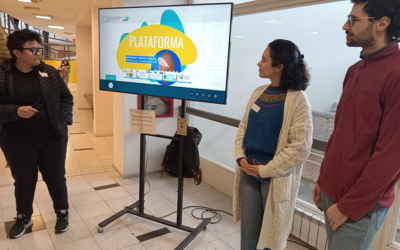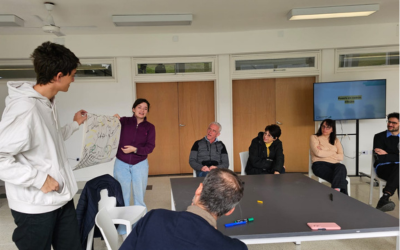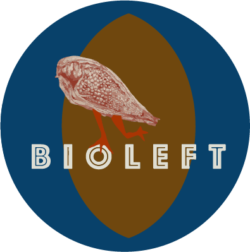The second UNSAM Scientific and Technological Conference took place between May 27 and 30, where research teams from all academic units of the University presented progress in their research work and exchanges between colleagues from different disciplines were encouraged.

During the conference, Bioleft members led two activities. Florencia Chena, supported by Almendra Cremaschi, Julián Asinsten and Román del Valle presented the work “Digital platforms and socio-environmental problematics: the case of Bioleft”. During her exposition, Florencia shared progress in developing our platform, an artefact that seeks to create a digital ecosystem for farmers, breeders, technicians, extensionists and consumers. Florencia is leading the development of the new version of the platform, which will be presented towards the end of 2024 and, like the previous versions, was co-constructed between software developers, researchers and farmers. During the presentation, Florencia highlighted three main functionalities the platform already has: a seed catalogue, a farm notebook and a digital community. The Catalogue’s goal is to make visible and available seeds that are not easy to find in the market, and yet are fundamental to diverse types of agriculture, such as family farming, organic and agroecological. By being available in a digital ecosystem, we hope to foster its circulation through open-source licenses, which Bioleft has developed to transfer genetic material. The virtual field books allow the systematization and exchange of seed and plant information to facilitate knowledge co-production. This is a key tool to support our participatory breeding experiments. https://www.bioleft.org/en/mejoramiento-participativo/. Lastly, the Digital Community is an open space to connect different users and create a network of open seeds, exchanging seeds, knowledge and information.
At the end of her presentation, Florencia commented on the challenges we are addressing with the new platform version. We are developing a platform adapted to the needs of its users. However, the platform is used by multiple stakeholders with specific needs, so we are carrying out a collaborative research and testing process to adequate the platform to diverse goals and contexts. Also, not every potential user feels comfortable with digital tools and many lack an internet connection at their farm or related workplaces. Hence, the new version will count with offline functionalities and will be presented in a friendly and intuitive language. In this sense, Florencia highlighted that an important learning of this process was to understand how to navigate the tension between the need to simplify the upload of information by users and the need to build robust knowledge about the seeds that are part of the digital platform. The last challenge presented by Florencia is how the Bioleft digital ecosystem interacts with different legal frameworks that regulate seed systems.

The second activity in which Bioleft was involved during the conference was the “Workshop on the design of participatory processes for innovation and sustainability” which Julián Asinsten, Bioleft coordinator, led with the support of Lilia Stubrin, Mariano Fressoli and Almendra Cremaschi, Bioleft director.
The workshop was divided into two parts. In the first one, Julián presented a conceptual introduction to participatory approaches and co-creation techniques on innovation and sustainability processes. This journey sought to share experiences about participatory processes, understand their potential to lead to innovative solutions to social problems and reflect on their possibilities and limitations. Bioleft experience was used as an example of this potential. Hence, during the workshop, Julián brought the experience of the Transformation Labs that between 2016 and 2018 gave rise to the Bioleft project through the collaboration among farmers, researchers and public policy specialists who looked forward to finding answers to sustainability problems in the seed system. Also, during the exposition, different participatory techniques used in a workshop led by Bioleft were presented, such as the case of “super corn” where researchers from INTA and Agronomy School of the University of Buenos Aires and corn farmers co-designed experimental observational variables to a participatory breeding experiment through a drawing of “super corns”, which allowed to establish a conversation and coordination among the participants.
In the second stage, the workshop moved to the practice. The participants, among whom were researchers from different areas of the University, including the vice-chancellor, Ana María Llois, engaged in a speculative exercise in groups. There, seizing on the conference context, they were invited to represent on a drawing how they saw the relationship of the University with society and envision how this relationship could be transformed in the future. The goal was for every group to create a visual metaphor to reflect on this issue and to create new ideas for the future. Drawings and metaphors were vast and rich; some drew trees and root tissues to frame and think in the present; others thought the relationship between University and society nowadays is represented by frontiers, apparently hard to cross. Thinking about the future brought back other ideas; some envisioned that this relationship must be like a mycorrhizal network: interconnected and decentralized. Others chose the ginger: an intense, spicy and reproducible relationship.
